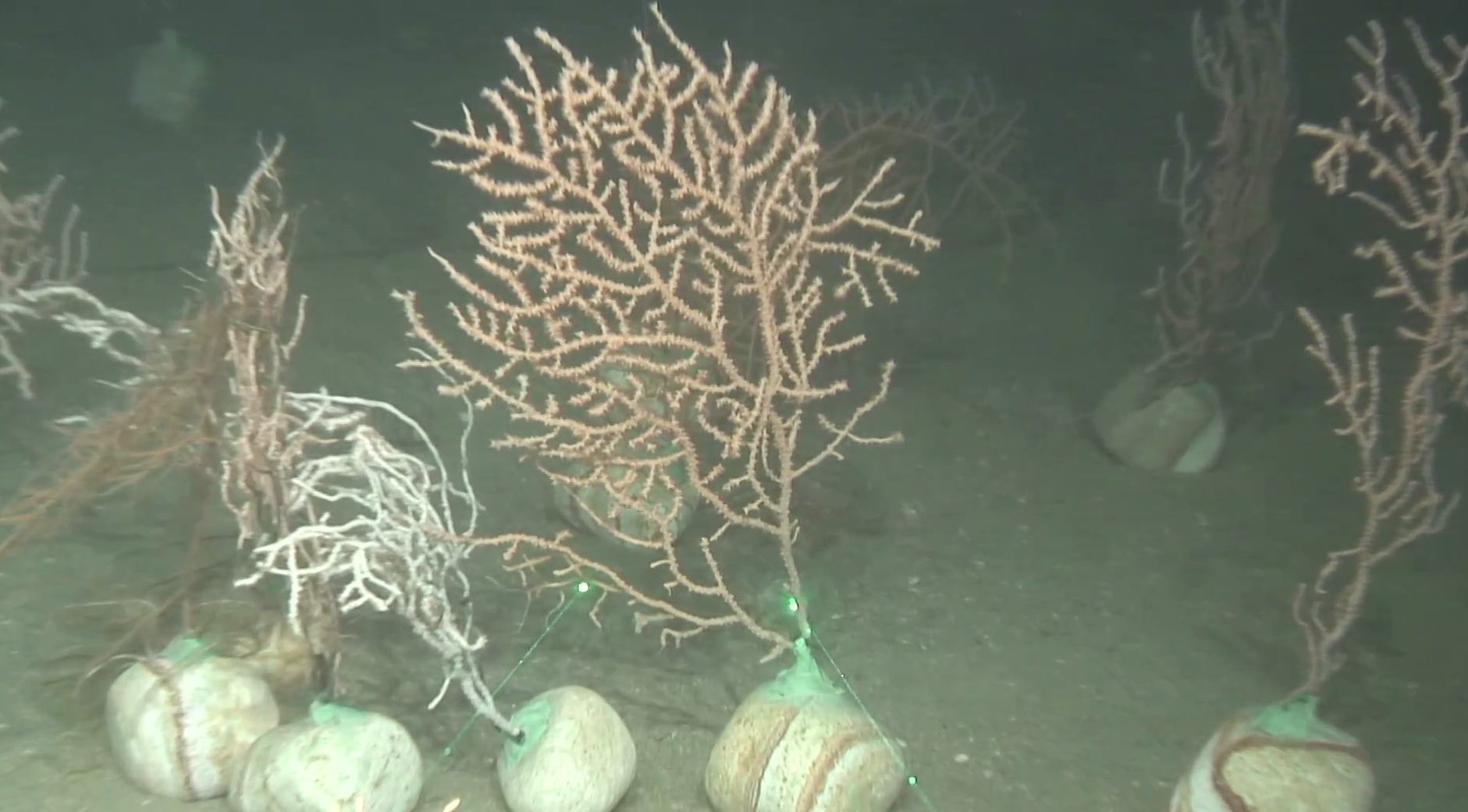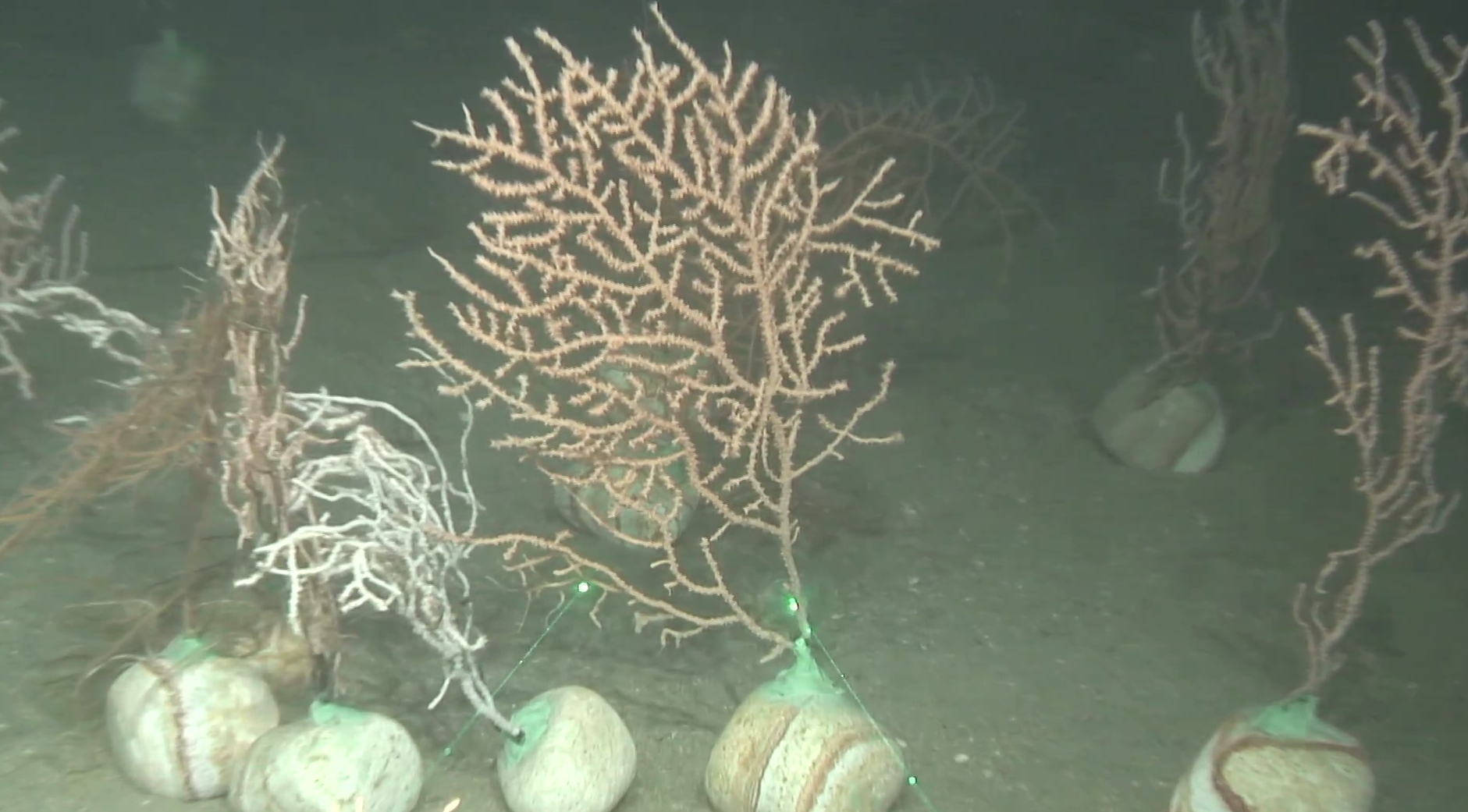02-06-2023
The LIFE Ecorest project releases on the Catalan coast more than 250 corals and gorgonians recovered with the collaboration of the fishing sector
Barcelona, June 2, 2023. The LIFE Ecorest project has released more than 250 organisms caught accidentally in the nets of the Catalan coast during fishing activity and which have been rescued by fishermen and recovered in the aquariums installed in the different confraternities LIFE Ecorest is an initiative coordinated by the Institute of Marine Sciences (ICM-CSIC) with the participation of teams from the Department of Evolutionary Biology, Ecology and Environmental Sciences of the Faculty of Biology and the Research Institute of Biodiversity of the University of Barcelona (IRBio).
Specifically, 143 gorgonians of the species Eunicella cavolini, Eunicella singularis and Leptogorgia sarmentosa, 106 soft corals of the species Alcyonium palmatum and some bryozoans have been returned to the sea. The organisms were released into the natural environment in the areas of Vilanova i la Geltrú, Palamós and Arenys de Mar, at a depth between 90 and 140 meters. In addition, in Vilanova it was possible to verify the survival success of these organisms after visualizing, through a remotely operated underwater vehicle (ROV, for the acronym in English), that the gorgonians had established right at the bottom.
This action was carried out during the second oceanographic campaign of the project, with the participation of the research teams of the Institute of Marine Sciences (ICM-CSIC) and the University of Barcelona-IRBio. The objective was to collect information on the sea beds of the network of Marine Reserves of Fishing Interest located on the Catalan coast, areas of action of the project, and to release the specimens recovered to the fishermen's brotherhoods.
During the one-month campaign, 34 dives were carried out with an ROV to carry out visual inspections of 15 no-fishing areas, which represent 80 linear kilometers, as well as nearby control areas.
In a preliminary assessment, the scientific team has observed differences between the current fishing areas and those where fishing has been closed for more than a year. In the former, the seabed is smoother and with marks from fishing gear, while in the protected areas it has been possible to observe a natural three-dimensionality, created by the fauna that inhabits the seabed itself, which is, in addition , more abundant.
Images for scientific monitoring
During the first campaign, carried out in October 2022, the scientific team anchored a Lander, a structure that incorporates a camera and different environmental sensors. It is a quantitative and non-invasive sampling system that is positioned in the background and works statically and autonomously for different time intervals. In this case, the Lander has been anchored in an area of soft substrates for nearly six months and has been recovered during this second campaign. Their mission has been to take images of the bottom every 30 minutes, which will be processed and analyzed by the scientific team in the coming months to learn about the temporal dynamics and interactions between different species.
Monitoring of released species in reserve areas will also be carried out via video, both with an ROV and an autonomous underwater vehicle (AUV), in future campaigns. The next one will take place during this month of June with the aim of anchoring the Lander again, continuing with the return of the organisms collected from the different confraternities and with the exploration of the 15 reserve areas, this time with an autonomous vehicle.
LIFE ECOREST
In the project area, along the coast of Barcelona and Girona, it is estimated that more than 90% of the seabed between 50 and 800 meters deep shows signs of degradation, which makes it difficult to regenerate natural resources. This area is considered a point of great ecological importance due to the high concentration of endangered, threatened or vulnerable species, including corals and gorgonians.
For this reason, until 2026, the action program of the LIFE Ecorest project will serve to try to improve the state of conservation of deep marine habitats and demonstrate the effectiveness of participatory management of the fishing sector.
This initiative, which is coordinated by the ICM-CSIC, has as partners the Federation of Fishermen's Brotherhoods of Girona, the Biodiversity Foundation of the Ministry for the Ecological Transition and the Demographic Challenge, the University of Barcelona and WWF Spain, as well as the financial contribution of the LIFE Program of the European Union.

Gorgonians restored as part of the LIFE Ecorest project
Source: UB Communication
Specifically, 143 gorgonians of the species Eunicella cavolini, Eunicella singularis and Leptogorgia sarmentosa, 106 soft corals of the species Alcyonium palmatum and some bryozoans have been returned to the sea. The organisms were released into the natural environment in the areas of Vilanova i la Geltrú, Palamós and Arenys de Mar, at a depth between 90 and 140 meters. In addition, in Vilanova it was possible to verify the survival success of these organisms after visualizing, through a remotely operated underwater vehicle (ROV, for the acronym in English), that the gorgonians had established right at the bottom.
This action was carried out during the second oceanographic campaign of the project, with the participation of the research teams of the Institute of Marine Sciences (ICM-CSIC) and the University of Barcelona-IRBio. The objective was to collect information on the sea beds of the network of Marine Reserves of Fishing Interest located on the Catalan coast, areas of action of the project, and to release the specimens recovered to the fishermen's brotherhoods.
During the one-month campaign, 34 dives were carried out with an ROV to carry out visual inspections of 15 no-fishing areas, which represent 80 linear kilometers, as well as nearby control areas.
In a preliminary assessment, the scientific team has observed differences between the current fishing areas and those where fishing has been closed for more than a year. In the former, the seabed is smoother and with marks from fishing gear, while in the protected areas it has been possible to observe a natural three-dimensionality, created by the fauna that inhabits the seabed itself, which is, in addition , more abundant.
Images for scientific monitoring
During the first campaign, carried out in October 2022, the scientific team anchored a Lander, a structure that incorporates a camera and different environmental sensors. It is a quantitative and non-invasive sampling system that is positioned in the background and works statically and autonomously for different time intervals. In this case, the Lander has been anchored in an area of soft substrates for nearly six months and has been recovered during this second campaign. Their mission has been to take images of the bottom every 30 minutes, which will be processed and analyzed by the scientific team in the coming months to learn about the temporal dynamics and interactions between different species.
Monitoring of released species in reserve areas will also be carried out via video, both with an ROV and an autonomous underwater vehicle (AUV), in future campaigns. The next one will take place during this month of June with the aim of anchoring the Lander again, continuing with the return of the organisms collected from the different confraternities and with the exploration of the 15 reserve areas, this time with an autonomous vehicle.
LIFE ECOREST
In the project area, along the coast of Barcelona and Girona, it is estimated that more than 90% of the seabed between 50 and 800 meters deep shows signs of degradation, which makes it difficult to regenerate natural resources. This area is considered a point of great ecological importance due to the high concentration of endangered, threatened or vulnerable species, including corals and gorgonians.
For this reason, until 2026, the action program of the LIFE Ecorest project will serve to try to improve the state of conservation of deep marine habitats and demonstrate the effectiveness of participatory management of the fishing sector.
This initiative, which is coordinated by the ICM-CSIC, has as partners the Federation of Fishermen's Brotherhoods of Girona, the Biodiversity Foundation of the Ministry for the Ecological Transition and the Demographic Challenge, the University of Barcelona and WWF Spain, as well as the financial contribution of the LIFE Program of the European Union.

Gorgonians restored as part of the LIFE Ecorest project
Source: UB Communication
